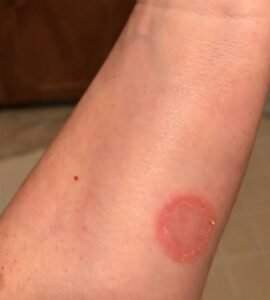Currently Empty: Rs. 0.00

What is a ringworm infection?
Ringworm is a fungal infection caused by dermatophytes, which are fungi that
thrive on the skin, hair, and nails. It can affect people of all ages and is
highly contagious.
How is it transmitted?
Ringworm spreads primarily through direct skin-to-skin contact with an infected
person or animal. It can also spread through contact with contaminated surfaces
such as towels, clothing, combs, or floors in communal areas like gyms or
swimming pools. Animals, particularly pets like cats and dogs, can also be
carriers.
What are the body parts affected?
Ringworm can affect several areas of the body, including Scalp , Feet , Groin ,
the nails making them thick and discolored. Can affect the skin anywhere on the
body, creating round, red patches.
What are the main symptoms?
The symptoms of ringworm can vary depending on the affected area but generally
include:
- Red, itchy patches of skin with a raised, scaly border.
- A circular or ring-shaped rash.
- Blisters or peeling skin in some cases.
- Hair loss (in scalp infections).
- Thickening, discoloration, or crumbling nails (in nail infections).
Why is it described as a ringworm infection?

The name “ringworm” comes from the appearance of the infection. The rash typically forms a circular shape with a clearer center, resembling a ring. Historically, it was believed that the infection was caused by worms, but it is
actually a fungal infection. Despite its name, ringworm has nothing to do with worms.
What are the main risk groups?
Certain groups are at higher risk of contracting ringworm:
- Children: Especially those in close contact with pets or other children.
- Athletes: Those who engage in sports involving physical contact or shared equipment
- People with compromised immune systems: Those with HIV/AIDS or other conditions
that weaken immunity are more susceptible. - Pet owners: Pets, particularly cats and dogs, can spread ringworm.
- People with diabetes
- Any person who has done organ transplants
What are the main risk factors/positive factors?
Several factors increase the likelihood of developing ringworm:
- Poor hygiene: Not washing hands or body frequently, particularly after touching
potentially contaminated surfaces. - Warm and humid conditions: Fungi thrive in moist environments, so excessive
sweating or wet clothes can contribute. - Close contact with infected individuals or animals: As ringworm is highly
contagious, direct contact is a major risk factor. - Weakened immune system: Conditions like diabetes, HIV/AIDS, and certain medications
(e.g., steroids) can make one more prone to fungal infections.
How can ringworm be avoided?
Preventing ringworm involves maintaining good hygiene and avoiding exposure:
- Wash
your hands regularly with soap and water, especially after handling
animals or touching potentially contaminated surfaces. - Keep
skin dry and clean. Use antifungal powders or sprays if prone to excessive
sweating. - Avoid
sharing personal items such as towels, combs, and clothing. - Wear
protective footwear in public showers, locker rooms, or swimming pools. - Keep
pets clean and check for signs of ringworm if you suspect they may be
infected.
What are the treatments for ringworm?
Treatment typically involves antifungal medications, which can be applied
topically or taken orally:
- Topical antifungal creams, ointments, or powders are effective for most skin infections.
- Oral antifungal medications may be necessary for severe or widespread infections, such as scalp or nail infections.
- Shampoos containing antifungal ingredients may be used for scalp infections.
It is important to follow the treatment plan completely to
prevent recurrence.
What should not be done?
Avoid these common mistakes to prevent worsening the infection or spreading it:
- Do not scratch the infected area: Scratching can spread the infection to other
areas of the body or others. - Avoid tight or wet clothing: Wearing damp clothes or tight shoes can create an
ideal environment for fungi to thrive. - Do not share personal items: This includes towels, hats, and clothing, to prevent
transmission to others. - Avoid self-diagnosis and self-medication: If symptoms persist, seek medical
advice to get the correct treatment and avoid complications.
Why should we be educated about ringworm?
Ringworm is common in Sri Lanka and can often be misdiagnosed as pityriasis
versicolor,(Aluham) leading to incorrect
treatment. Education helps people recognize the symptoms early and seek proper
treatment.


